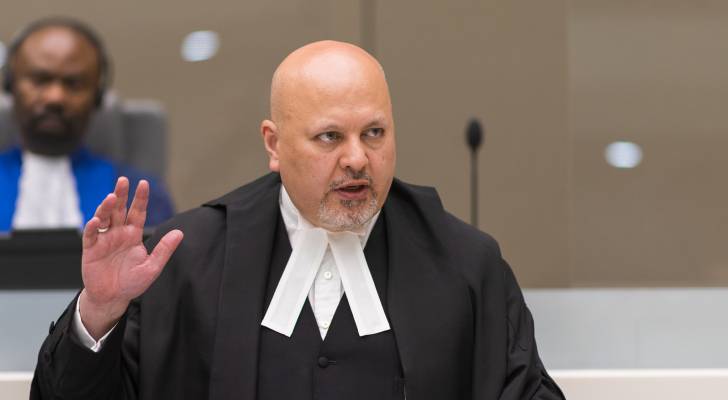Karim Khan (Credit: International Criminal Court)
New report exposes pressure tactics used against ICC over 'Israel' case
The International Criminal Court (ICC) is facing what many observers consider the most turbulent chapter in its 23-year history. From political retaliation and espionage threats to damaging internal scandals, the court in The Hague has become the center of a storm involving some of the world’s most powerful governments, according to French newspaper Le Monde.
At the heart of the controversy is the ICC’s investigation into war crimes committed in Palestinian territories, including Hamas' operation on October 7, 2023, and subsequent 'Israeli' military actions in Gaza and the West Bank. In November 2024, the court issued arrest warrants for 'Israeli' Prime Minister Benjamin Netanyahu and former Defense Minister Yoav Gallant, a decision that ignited a fierce backlash from the United States and its allies.
“I’ve lived through the worst months of my life in The Hague,” said Andrew Cayley, a British lawyer who led the case alongside American Brenda Hollis. Cayley resigned in March 2025 following a threat warning and signs that he was targeted by the Trump administration.
That backlash intensified in the months leading up to the warrants. Prosecutor Karim Khan reportedly informed US, UK, and French officials of his intent to file charges in March 2024. The reaction was swift and severe: pressure campaigns, diplomatic threats, and an alleged effort to derail the investigation entirely.
In one example, former UK Foreign Secretary David Cameron reportedly phoned Khan directly in April, warning, “This is a hydrogen bomb!” and suggesting the UK could exit the Rome Statute if the prosecution continued.
Tensions escalated further in May, when Khan was temporarily suspended following sexual assault allegations published by the Wall Street Journal. The ICC confirmed that the prosecutor, already under scrutiny for previous harassment complaints, was accused of raping a colleague multiple times over a year. While no formal complaint was filed in the Netherlands, ICC President Tomoko Akane intervened to suspend Khan pending a review.
Italian magistrate and former ICC judge Cuno Tarfusser criticized the process, calling it “a coup” and an “irregular” action that breached confidentiality protocols.
The incident triggered speculation about whether the allegations were part of a larger campaign to discredit Khan and reverse the 'Israeli' arrest warrants. Dutch intelligence services acknowledged growing foreign pressure, stating that the ICC had become an "attractive target for espionage and subversive influence."
US officials also sought to shift jurisdiction to 'Israeli' courts using the principle of complementarity. However, efforts to enable a fact-finding mission in Gaza were blocked when 'Israel' reportedly refused to grant access via its territory, despite the Palestinian Authority’s (PA) offer of entry through Egypt.
"We canceled the Rafah mission, but never received written approval from Israel," a prosecutor’s office source said.
Further intrigue unfolded around an alleged dinner proposal in Jerusalem. A lawyer close to Khan claimed that US advisor Thomas Lynch suggested a meeting between Khan, Netanyahu, and attorney Alan Dershowitz.
“A remake of Oliver Twist,” Khan reportedly remarked. “Netanyahu and I eating roast turkey while the Gazans look on starving. It’s a dangerous idea.”
Lynch denied the story, calling it “false and misleading.”
The sexual assault allegations emerged shortly after, when the alleged victim spoke to two ICC staff, including Lynch. The complaint, forwarded to human resources, was quietly shelved after the woman refused to cooperate further. Still, Lynch’s memo leaked in October, feeding speculation about internal sabotage.
In May, Khan officially submitted the arrest warrants. A month later, G7 nations debated damage control. Germany cited complementarity, France invoked immunity, and the UK argued that the ICC’s move violated the Oslo Accords.
Then, in October, an anonymous X account published the assault allegations. Days later, US Senator Lindsey Graham openly condemned Khan. By November 21, the ICC issued the arrest warrants. 'Israel' promptly began legal efforts to nullify them.
In February 2025, the US sanctioned Khan. Additional sanctions against four ICC judges followed in June. Nonetheless, Khan continued building cases against two more 'Israeli' officials: National Security Minister Itamar Ben Gvir and Finance Minister Bezalel Smotrich.
On May 1, Khan met longtime friend and lawyer Nicholas Kaufman at The Hague’s Hotel Des Indes. Kaufman, reportedly acting after consulting Netanyahu’s advisor Roy Schöndorf, proposed downgrading the case’s secrecy status to allow 'Israeli' access. According to a meeting summary, Kaufman warned Khan: withdraw the warrants or "they will destroy you and destroy the Court."
Kaufman confirmed the meeting but denied issuing threats, saying he was trying to help Khan "recover from his mistakes."
Ten days later, Khan was suspended. The cases against Ben Gvir and Smotrich were put on hold. “The case is underwater now,” a court source admitted.
With Khan sidelined, the Palestine investigation is now being jointly overseen by deputies Mame Mandiaye Niang of Senegal and Nazhat Shameem Khan of Fiji, who are reportedly alternating on official documents to avoid further sanctions.
An independent UN inquiry into the allegations against Khan is expected to conclude in September. A three-judge panel, composed of one American, one Caribbean, and one European magistrate, will determine whether Khan committed serious misconduct. If so, member states could vote on his removal.
In The Hague, discussions over Khan’s possible successor have already begun. One Western diplomat suggested that "a woman from a less powerful country" might be chosen, a move seen as a way to quietly reverse course on the controversial arrest warrants.




